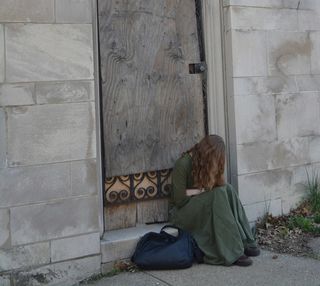
Over the past few years, I have been contacted by several families who have a loved one struggling with schizophrenia. Many of these people with schizophrenia are homeless.
For me, becoming homeless was a direct result of schizophrenia. Because of the illness, I could not work the easiest job or focus enough to take even one class. The illness brought on a paranoia which led me to cut off all my family members and my closest friends.
While homeless, I badly wanted a place to sleep, as I was tired of sleeping outside in a churchyard. Remarkably, I was given plenty of opportunities to leave my homeless life, and I rejected every one of them.
In 2004, one year after I began sleeping in a library, I accepted an invitation from a friend to stay with two women. At his expense, I was flown from Los Angeles to live with an elderly Chinese mother and her daughter in New Mexico. I was excited and hopeful to be taken in by this family. It seemed that my dream of having a new family had come true.
When I arrived, I was welcomed into a spacious and beautifully decorated home. I was given a private bedroom suite with a bathroom and large windows.
My new friends, the two Chinese women, cooked all my meals which included homemade Chinese food which I especially liked. There was no pressure placed upon me to contribute financially or find employment. I felt entirely welcomed and provided for. I accompanied them to a few parties and met gracious and kind new people.
Surprisingly, after only a few days of living in such a comfortable and secure setting, I found myself becoming increasingly irritated and restless. No longer did I care about the soft bed with the lovely floral comforter, the private suite which I had been generously given, or the impressive Chinese artwork in their spacious living room. I actually missed sleeping in the library as a homeless person.
Looking back, I clearly realize that by interpreting the world through the prism of untreated schizophrenia, my deepest desire was to remain detached from reality. Caught in a world of delusion, my expectations were to become a world famous and powerful prophet and send billions of dollars of aid to people throughout the world who subsisted in poverty.
By settling into a stable home with the family in New Mexico, I began to feel like an ordinary person. I did not want to remember that I had not finished college, had not fulfilled my desire to be married (as many of my former friends had) and that I probably would not ever be wealthy, famous, or politically powerful. I could not face or accept the prospect of reality as it stood.
In my illness, I thought my desire was for friends, a home, a husband and an extended family. However, the choices I made revealed a much stronger desire. By abruptly returning to the churchyard in Los Angeles, I discarded the hospitality that had been so generously extended to me in New Mexico. I preferred sleeping outside, homeless and alone. Years before, I had also rejected my own caring and loving family. Schizophrenia drove me into severe isolation.
It would be three long years after leaving New Mexico until the time I was finally hospitalized. I was diagnosed with schizophrenia and antipsychotic medication was prescribed, (I wish it had been sooner).
Within days of taking my first dose, I developed a longing to fly back to Ohio and live with my parents. Untreated schizophrenia had long dimmed the remembrance of my parents, my happy childhood and the love and support of my family. After four years of rejecting their offer to live in Ohio, (choosing instead to live on the street), it suddenly made sense. The medication was beginning to clear my mind.
I began a new chapter of life in Ohio with my parents. Initially, I did well and enjoyed my new environment, especially their flower gardens and the neighborhood where they lived. But when the medication’s severe side effects began to affect my everyday life, I discontinued my medication.
Approximately two weeks after rejecting my medication, I wanted to resume my homeless lifestyle. I confronted my father and screamed at the top of my lungs “I want to go back to LA!” over and over again, as though that would make it happen. Living in reality felt like being trapped in a tiny cage.
The police arrived while I was still screaming. Once again I was transported to a hospital. After gaining a deeper understanding of my diagnoses and the prospects for recovery, I restarted my medication and since then, have never missed a dose.
As a mental health advocate, I am continually surprised by the number of people I meet who have loved ones who choose homelessness as a result of untreated schizophrenia. Just like my story, while living in delusion, many individuals refuse help from family and community programs. They act in the same bizarre way that I used to.
I am grateful for antipsychotic medication that has enabled me to reclaim a healthy mind and live with contentment in reality. I finished college and have found purposeful employment. I love to spend time with friends and family. I have found ordinary life to be a gift.
Through advocacy, it is my hope that in sharing my own journey, I will in some way encourage others. For me, antipsychotic medication was and continues to be my key to recovery. Today, grounded in reality, I find true joy in my home.




